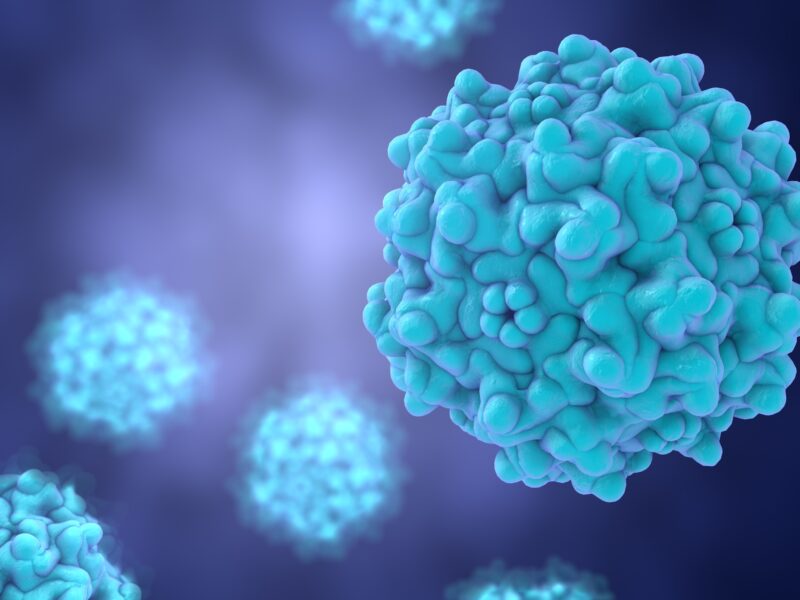Phase 1 Study Shows Promise of Gene Replacement Therapy for Spinal Muscular Atrophy Type 1
Phase 1 Study Shows Promise of Gene Replacement Therapy for Spinal Muscular Atrophy Type 1 https://pediatricsnationwide.org/wp-content/uploads/2021/02/AdobeStock_134232290-DNA-header-1024x575.gif 1024 575 Abbie Miller Abbie Miller https://pediatricsnationwide.org/wp-content/uploads/2023/05/051023BT016-Abbie-Crop.jpg
The phase 1 clinical study shows that gene therapy extends survival of patients and supports achievement of milestones previously unseen in the natural course of the disease.
A one-time intravenous infusion of the high dose of gene therapy extended the survival of patients with spinal muscular atrophy type 1 (SMA1), according to a study published in the New England Journal of Medicine. Researchers from Nationwide Children’s Hospital in collaboration with AveXis, Inc. and The Ohio State University College of Medicine, report the phase 1 clinical trial results of the much-awaited study for SMA1.
“My team at Nationwide Children’s has worked with commitment and dedication to develop a therapy that may subsequently be shown through future clinical trials to potentially alter the course of this unforgiving condition and provide a therapeutic option for the families and infants with SMA1,” says Jerry Mendell, MD, principal investigator in the Center for Gene Therapy at Nationwide Children’s.
SMA1 is a progressive, childhood, neuromuscular disease caused by a mutation in a single gene. Children with SMA1 fail to meet motor milestones and typically die or require mechanical ventilation by 2 years of age. The phase 1 clinical trial is the first to test the functional replacement of the mutated gene responsible for SMA1.
An intravenous injection of AVXS-101, a modified adeno-associated virus serotype 9 (AAV9), delivered the SMN1 gene to 15 patients. Three patients received a low dose, while 12 patients received a high dose. The patients in the high dose group demonstrated improvement in motor function not previously observed in this disease, and they had a decreased need for supportive care compared to the natural history of the disease.
Specifically, according to a release by AveXis, Inc., as of August 7, 2017, all 15 patients (100 percent) are alive, event-free and have reached at least 20 months of age. The expected event-free survival rate at 20 months of age based on the natural history of the disease is 8 percent.
At the end of the study period, the publication reported that 100 percent of patients reached 13.6 months of age without the need for permanent ventilator assistance, compared to only 25 percent survival without ventilator assistance in a historical comparison group. Of the patients treated with the high dose, nine sat unassisted, nine rolled over, 11 sat with support, and two walked independently at last follow up. The researchers have observed no waning of effect or clinical regression in motor function achievements in the up to two years of follow up.
“In this first phase of clinical trials, we have observed preliminary results that appear to be promising compared to the natural history of SMA Type 1,” says Dr. Mendell, also a faculty member at The Ohio State University College of Medicine.
According to Dr. Mendell, no child with SMA1 has been able to talk, but now, “11 of 12 children in the high-dose group are now talking.”
In terms of safety, five adverse events in four patients were reported as treatment related. These were limited to elevated serum transaminases without other liver enzyme abnormalities in four patients. The enzyme elevations were attenuated by prednisolone treatment with no further clinical or persistent problems. The drug appears to be safe and well tolerated.
This study builds on nearly three decades of foundational research led by teams at Nationwide Children’s and Ohio State’s Wexner Medical Center and exemplifies the strong basic science and clinical bonds between the two institutions. Arthur Burghes, PhD, of Ohio State created a ground-breaking SMA mouse model that remains the standard by which all therapies, including AVXS-101, are initially tested. Senior author of the study, Brian Kaspar, PhD, during his appointment at Nationwide Children’s discovered that the AAV9 vector was capable of crossing the blood brain barrier when injected into the vascular system to deliver genes directly to motor neurons. The two laboratories then collaborated to show that scAAV9-SMN, when delivered to SMA mice shortly after birth, completely prevented their neuromuscular disorder. The laboratories also collaborated to successfully prove that reversing a protein deficiency through gene therapy is effective in improving and stabilizing SMA in a large animal model.
“In neurological disease, it is rare to go from gene defect to therapy so directly, and the fact that this has happened here in one place is perhaps even rarer,” said John Kissel, MD, chair of Neurology at Ohio State and director of the SMA Clinic at Nationwide Children’s.
In July 2016, AveXis, Inc., a clinical-stage gene therapy company developing treatments for patients suffering from rare and life-threatening neurological genetic diseases, announced that the U.S. Food and Drug Administration (FDA) granted Breakthrough Therapy Designation for the treatment based on preliminary clinical results from the trial of AVXS-101. Next steps will include launching a phase 2 clinical trial.
This trial was funded by Sophia’s Cure Foundation, The Research Institute at Nationwide Children’s and AveXis, Inc.
Photo credit: Adobe Stock
Animation credit: Nationwide Children’s
About the author
Abbie (Roth) Miller, MWC, is a passionate communicator of science. As the manager, medical and science content, at Nationwide Children’s Hospital, she shares stories about innovative research and discovery with audiences ranging from parents to preeminent researchers and leaders. Before coming to Nationwide Children’s, Abbie used her communication skills to engage audiences with a wide variety of science topics. She is a Medical Writer Certified®, credentialed by the American Medical Writers Association.
- Abbie Millerhttps://pediatricsnationwide.org/author/abbie-miller/
- Abbie Millerhttps://pediatricsnationwide.org/author/abbie-miller/
- Abbie Millerhttps://pediatricsnationwide.org/author/abbie-miller/
- Abbie Millerhttps://pediatricsnationwide.org/author/abbie-miller/
- Post Tags:
- Center for Gene Therapy
- Neurology
- SMA







